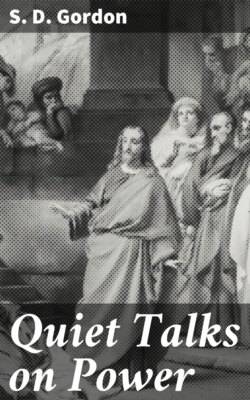Читать книгу Quiet Talks on Power - S. D. Gordon - Страница 12
На сайте Литреса книга снята с продажи.
The Olivet Message.
ОглавлениеOur needs argue the necessity of power. And the argument is strengthened by the peculiar emphasis of the Master's words. Do you remember that wondrous Olivet scene? In the quiet twilight of a Sabbath evening a group of twelve young men stand yonder on the brow of Olives. The last glowing gleams of the setting sun fill all the western sky, and shed a halo of yellow glory-light over the hilltop, through the trees, in upon that group. You instantly pick out the leader. No mistaking Him. And around Him group the eleven men who have lived with Him these months past, now eagerly gazing into that marvelous face, listening for His words. He is going away. They know that. Coming back soon, they understand. But in His absence the work He has begun is to be entrusted to their hands. And so with ears and eyes they listen intently for the good-bye word—His last message. It will mean so much in the coming days.
Two things the Master says. The first is that ringing "go ye" so familiar to every true heart. The second is a very decisive, distinct "but tarry ye." What, wait still longer! Tarry, now, when your great work is done! Listen again, while His parting words cut the air with their startling distinctness "but tarry ye—until ye be endued with power."
I could readily imagine impulsive Peter quickly saying, "What! shall we tarry when the whole world is dying! Do we not know enough now?" And the Master's answer would come in that clear, quiet voice of His, "yes, tarry: you have knowledge enough, but knowledge is not enough, there must be power."
There is knowledge enough within the christian church of every land—aye, knowledge enough within the walls of this building to-night to convert the world, if knowledge would do it. Into many a life, through home training, and school, and college, has come knowledge, while power lingers without—a stranger. Knowledge—the twin idol with gold to American hearts—is essential, but, let it be plainly said, is not the essential. Knowledge is the fuel piled up in the fireplace. The mantel is of carved oak, and the fenders so highly polished they seem almost to send out warmth, but the thermometer is working down toward zero, and the people are shivering. The spark of living fire is essential. Then how all changes! There must be fire from above to kindle our knowledge and ourselves before any of the needed results will come.
There is no language strong enough to tell how absolutely needful it is that every follower of Jesus Christ from the one most prominent in leadership down to the very humblest disciple, shall receive this promised power.
Look at these men Jesus is talking to. There is Peter, the man of rock, and John and James, the sons of thunder. They were with the Lord on the Transfiguration Mount, and when He raised the dead. They were near by during the awful agony of Gethsemane. They were admitted nearer to the Master's inner life than any others. There is quiet matter-of-fact Andrew, who had a reputation for bringing others to Jesus. There is Nathanael, in whom is no guile. It is to these men that there comes that positive command to tarry. If they needed such a command, do not we?
"Yes," someone says, "I understand that this power you speak of is something the leaders and preachers must have, but you scarcely mean that there is the same necessity for us people down in the ranks, and that we are to expect the same power as these others, do you?" Will you please call to mind that original Pentecost company? There were one hundred and twenty of them. And while there was a Peter being prepared to preach that tremendous sermon, and a John to write five books of the New Testament and probably a James to preside over the affairs of the Jerusalem Church, and possibly a Stephen, and a Philip, yet these are only a few. By far the greater number, both men and women, are unnamed and unknown. Just the common, every-day folk, the filling-in of society; aye, the very foundation of all society. They had no prominent part to play. But they accepted the Master's promise of power, and His command to wait, as made to them. And as a result they, too, were filled with the Holy Spirit, that wonderful morning. I think, very likely, "the good man of the house" whose guest Jesus was that last night was there, and all the Marys, including the Bethany Mary, who simply sat at His feet, and the Magdalene Mary, and housekeeper Martha, and maybe that little lad whose loaves and fishes had been used about a year before. That was the sort of company that prayerfully, with one accord, not only waited but received that never-to-be-forgotten filling of the Holy Spirit.
Certainly, as some of you think, the preacher must have this power peculiarly for his leadership. But just as really he needs it because he is a man for his living, to make him sweet and gentle and patient down in his home: to make him sympathetic and strong in his constant contact with the hungry hearts he must meet. That young mechanic must have this promised power if he is to live an earnest, manly life in that shop. That school girl, whose home duties crowd her time so; that keen-minded student working for honors amid strong competition; these society young people; these all need, above all else, this promised power that in, and through, and around and above all of their lives may be a wholesomely sweet, earnest Christliness, pervading the life even as the odor of flowers pervades a room.
